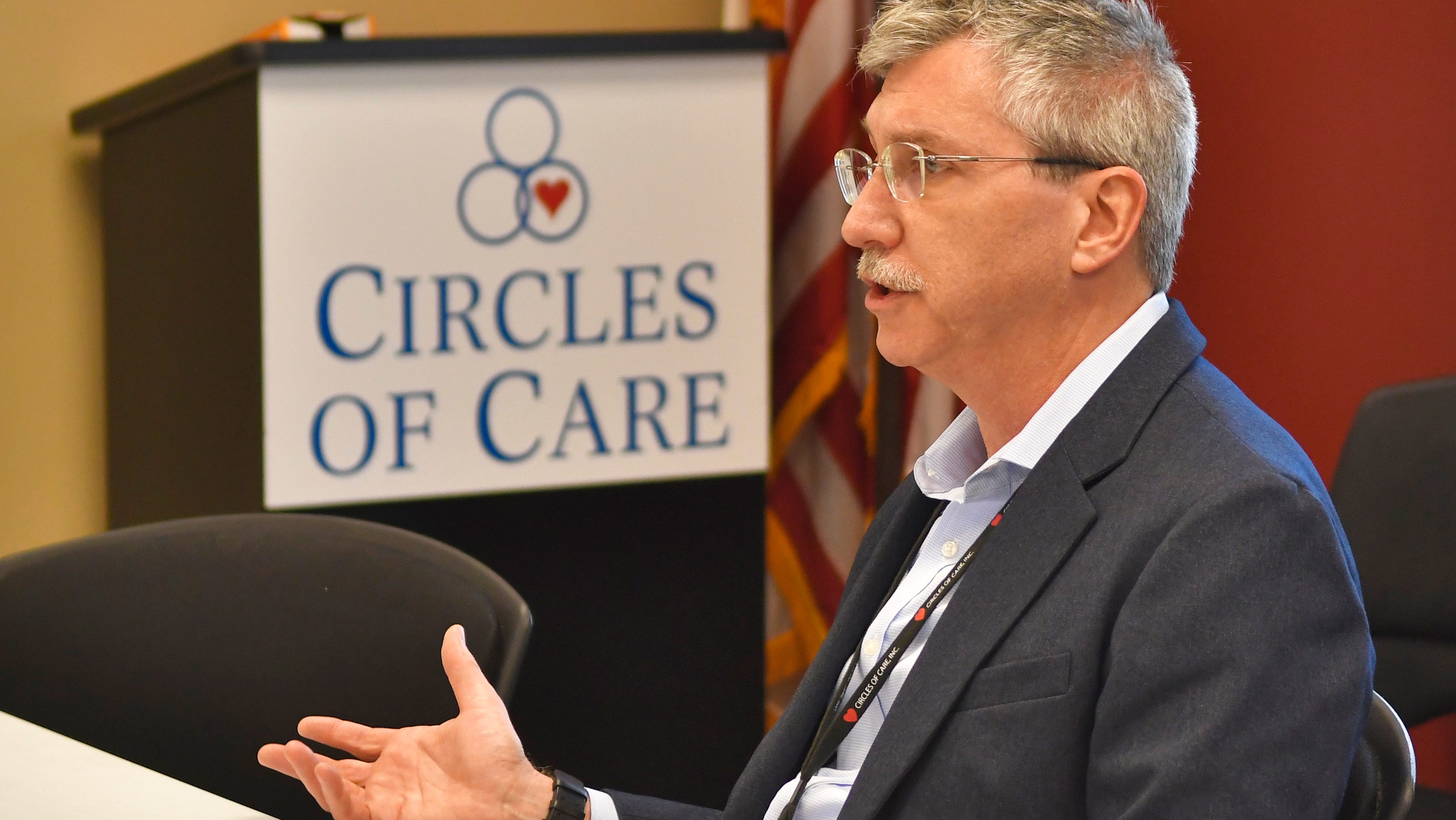
Circles of Care offers services in behavioral health care in Brevard
Circles of Care, inc. offers many services in behavioral health care, and has multiple locations in Brevard County.
Florida’s Baker Act is a law that allows for the involuntary detention of an individual for up to 72 hours for a mental health evaluation.A person can be Baker Acted if they are believed to be mentally ill, refuse voluntary examination, and are likely to cause harm to themselves or others.Law enforcement, licensed mental health professionals, physicians, and judges can initiate the Baker Act.
When someone is in the midst of a serious mental health crisis, they may be unable or unwilling to seek help on their own. In these intense, often confusing moments, Florida’s Baker Act offers a legal lifeline.
“The Baker Act provides a legal means for the involuntary examination and temporary detention of individuals experiencing severe mental health crises,” said Tonya Dix, executive vice president and chief operating officer at Circles of Care in Melbourne — one of two main Baker Act receiving facilities in Brevard County. The other is Palm Point Behavioral Health in Titusville.
While the idea of having someone detained involuntarily might feel unsettling or even frightening — especially when it’s a friend or loved one — taking that step could be the very thing that protects them in a moment of deep crisis, giving them a chance to stabilize and connect with care that could save their life.
“By intervening early in a mental health crisis, the Baker Act helps prevent escalation and supports recovery and stabilization,” Dix said.
But how does it actually work and who decides when it’s necessary? Here’s what you need to know.
What is the Baker Act?
When a mental health crisis hits, it doesn’t always come with a warning — and it doesn’t always leave time for someone to ask for help. Enacted in 1971, the Baker Act, officially known as the Florida Mental Health Act, is found under Chapter 394 of Florida Statutes, which outlines the state’s legal framework for mental health care, including voluntary and involuntary treatment.
When someone is in the midst of a mental health crisis — and may be a danger to themselves or others — Florida’s Baker Act lets certain professionals —like clinicians, law enforcement or judges — order an involuntarily exam at a mental health facility, where the person can be detained for up to 72 hours.
“Its primary goal is to ensure immediate safety — for both the individual in crisis and those around them,” Dix said. “It allows law enforcement officers, mental health professionals, and certain other authorities to intervene quickly and ensure the person receives necessary care and supervision.”
Crisis intervention, she says, is a critical function of the Baker Act. It’s not about long-term confinement — it’s about protection. When someone is spiraling into danger, the Baker Act opens a brief yet vital window to stabilize, seek support and start down a path toward recovery.
The Baker Act: By the numbers
According to the University of South Florida’s Baker Act Reporting Center, between June 30, 2024, and July 30, 2025, approximately 4,705 individuals in Brevard County received involuntary examinations under Florida’s Baker Act. Of those 1,119 were under the age of 18. Over the same time, across Florida, 160,042 people were Baker Acted — and for nearly 40% of them, it wasn’t their first time.
In 2019, 6,039 Brevard residents were involuntarily Baker Acted. In 2024, that number was 5,231. Although Baker Act numbers appear to have dropped, experts say the decline is due to improved data accuracy—not fewer incidents. The previous paper-based system often included duplicates, incomplete forms and inconsistent entries that inflated totals. Florida’s new web-based reporting system, launched in July 2023, now standardizes how dates and identifiers are recorded, giving a clearer, more reliable picture of actual Baker Act activity.
Who can be Baker Acted in Florida?
The Baker Act isn’t meant for someone exhibiting unusual behavior, such as simple intoxication, or conditions manifested by antisocial behavior or drug addiction. Instead, it’s designed for situations when someone is in a mental health crisis so severe that immediate evaluation is necessary to protect their safety or the safety of others.
“The law strikes a balance between urgent intervention and the protection of individual rights, outlining clear criteria and procedures for involuntary examination,” Dix said.
To initiate a Baker Act in Florida, three key criteria must be met:
∎ There must be reason to believe the person is mentally ill — meaning, under Florida Statute, they are unable to exercise conscious control over their actions, cannot accurately perceive reality, or lack the ability to understand their surroundings in a way that substantially interferes with their capacity to meet the ordinary demands of daily life.
∎ Because of this mental illness, the individual either refuses a voluntary examination or cannot understand that an examination is necessary.
∎ Without care or treatment, the person is likely to suffer serious neglect or pose a substantial risk of causing harm to themselves or others in the near future. This includes individuals who are actively suicidal, exhibiting violent or psychotic behavior, or are severely disoriented and unable to make safe decisions.
While most people associate the Baker Act with involuntary hospitalization, it also allows for voluntary admissions. This means that individuals who recognize they are in crisis can admit themselves to a designated mental health facility for evaluation and treatment. In both cases, the goal is to ensure safety, provide a professional evaluation, and connect the person with the appropriate care and support.
Who can initiate a Baker Act?
In Florida, the Baker Act allows specific individuals to initiate an involuntary mental health exam:
Law enforcement officersLicensed mental health professionals (like psychiatrists, psychologists or licensed counselors)PhysiciansJudges via court orderWhat about children and teens?
Children and teens can be Baker Acted if they meet the same criteria as adults. In these cases, a parent or guardian can contact a mental health professional or law enforcement to start the process — but school officials, pediatricians and emergency personnel can also initiate a Baker Act. And if that happens, parents or guardians must be immediately notified — and are typically involved in the child’s evaluation, treatment and discharge planning.
According to a 2023 report by the University of Florida Levin College of Law, each year, more than 37,000 children are Baker Acted in Florida —nearly twice the rate of the 25 other states that track such data. And the study’s author, Kaitlin Gibbs noted that Baker Acts are frequently initiated in schools where parents haven’t always been included in the decision-making process.
Due to concerns over the lack of parental involvement in school-based Baker Acts, Florida in 2021 passed the School Safety Bill, which not only requires that parents are notified before a Baker Act is initiated on a minor — it also mandates that law enforcement use the least restrictive method possible when transporting children.
In general, parents and guardians must be informed of their child’s location, condition and status changes. They can typically visit and participate in treatment — and if they believe the Baker Act was wrongly applied, they have the right to challenge it and advocate for their child’s release.
At Circles of Care, minors are treated at the D’Albora Children’s Crisis Stabilization Unit in Melbourne — a 16-bed unit that’s entirely separate from the adult unit.
As Director of the Children’s Advocacy Center of Brevard, Jeanie Raciti, who is also a licensed clinical social worker, said when a child is Baker Acted, it’s important to help them understand why.
It’s “for stabilization of their mental health and wellbeing,” she said. “It is not a cure, or a place to get away from their family when they are having familial issues.”
She also stressed the importance of following through with the discharge plan of care, adding that “some children really need this — but there are others that misuse the service.”
Does the Baker Act cost money?
There are costs associated with the Baker Act — however, crisis stabilization units do not require upfront payment — and the law prohibits facilities from denying or delaying treatment to a person with a mental illness based on their inability to pay.
At Circles of Care, CEO Stephen Lord said, financial status is never a barrier to treatment. “We are part of the public safety net,” he said. ‘’We provide services to anyone — fully insured, underinsured, or uninsured.”
Fees are often covered for those with private insurance or Medicaid/Medicare, however, depending on the coverage, there may be copays or deductibles that apply. For those who are unable to pay, the Florida Department of Children and Families (DCF) is responsible for ensuring that indigent patients receive Baker Act services at no cost.
How to have someone you know Baker Acted in Brevard County
If someone you care about is having a serious mental health crisis and may be a danger to themselves or others, the Baker Act is a legal way to get them help — even if they don’t want it.
In an emergency, you can call 9-1-1 to have law enforcement officers assess the situation and determine if the person meets the legal criteria for a Baker Act. If they do, the person will be taken into protective custody and transported to a mental health receiving facility.
You can also go to the Brevard County Clerk of Court and fill out a petition for involuntary examination, which is a written request asking a judge to order a mental health evaluation. There is no cost to file and if a judge agrees it meets the legal requirements, they will sign an order allowing law enforcement to take the person to a mental health facility.
Keep in mind, filing a false report to have someone Baker Acted in Florida is a serious offense. If a person knowingly provides false information to have someone wrongfully detained for a mental health evaluation, they could face legal consequences.
“Many individuals in crisis don’t recognize their need for help or may be unwilling to seek it,” Dix said. “The Baker Act creates a path for evaluation and treatment — even when someone can’t or won’t seek care on their own.”
This reporting is supported by a Journalism Funding Partners grant. Mental Health Reporter Jennifer Torres can be reached at JMTorres@gannett.com.

